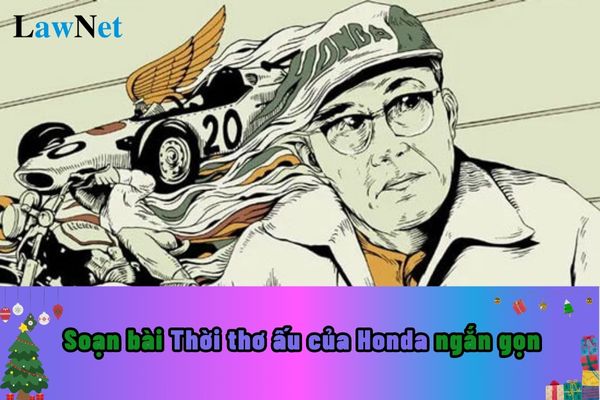What are the guidelines for preparing the brief lesson "The Childhood of Honda" in Vietnam? What are the 3 types of text corpus used in the 6th-grade Literature curriculum?
What are the guidelines for preparing the brief lesson "The Childhood of Honda" in Vietnam?
The work "The Childhood of Honda" is one of the texts that 6th-grade students will study in the 6th-grade Literature curriculum.
6th-grade students can refer to the guidelines for preparing the brief lesson "The Childhood of Honda" in Vietnam as follows:
|
Guidelines for preparing the brief lesson "The Childhood of Honda"
Analysis of the work "The Childhood of Honda"
> Main Content:
The article is an excerpt from the memoir of Soichiro Honda, the founder of the world-renowned Honda automobile company. Through it, the author reminisces about childhood memories closely tied to a passionate interest in machines and engines. Experiences such as observing explosions, chasing cars, and skipping school to watch airplanes sowed a burning dream in young Honda's heart: to create automobiles.
> Significance of the Lesson:
Showcasing talent and passion from a young age: The article demonstrates Honda's special inclination and talent from childhood. His intense passion for machines became a driving force that pushed him to continuously create and strive.
Roots of success: Childhood experiences formed Honda's personality and career orientation later on. His curiosity, eagerness to learn, and perseverance helped him overcome challenges to achieve resounding success.
Inspiration for the young generation: Honda's story is a great source of inspiration for young people, especially those with a passion for science and technology. The article affirms that success comes from passion, perseverance, and continuous learning.
> Artistic Value and Literary Devices:
Simple language, rich in imagery: The language in the article is lively and relatable, using many comparative and metaphorical images (e.g., "the clinking sound of anvils and hammers," "the hard-to-describe smell of burnt oil in the blue smoke," "flying like the wind") to help readers easily picture the scenes and emotions of the characters.
The character’s psychology is vividly depicted: The author successfully portrays a curious, eager-to-learn boy, a bit mischievous but full of enthusiasm. Small details, like skipping school to watch airplanes or making a pilot’s goggles from cardboard, create a unique and memorable character.
Enumeration device: Listing the types of machines and engines that the character observes helps readers clearly visualize Honda's diverse passions.
Comparison device: Comparing the feeling of seeing airplanes to riding a bicycle helps readers sense the character's excitement.
> Lessons Learned:
Pursue your passion: Always chase what you love, as passion is the motivation that helps us overcome any difficulties.
Continuous Learning: Always be curious, eager to learn, and constantly explore new things.
Perseverance: Success does not come easily; it requires perseverance and continuous effort.
Creativity: Always think differently and find new solutions to problems.
> Conclusion:
The article "The Childhood of Honda" is not just a story about childhood but also a valuable lesson on the life and career of a genius. Through this story, we gain a clearer understanding of the importance of nurturing passion from a young age and the significance of pursuing dreams.
|
*Note: The above guidelines for preparing the brief lesson "The Childhood of Honda" in Vietnam are for reference only./.

What are the guidelines for preparing the brief lesson "The Childhood of Honda" in Vietnam? What are the 3 types of text corpus used in the 6th-grade Literature curriculum? (Image from the Internet)
What are the 3 types of text corpus used in the 6th-grade Literature curriculum in Vietnam?
Under Subsection 2, Section 5 of the General Education Program in Literature issued together with Circular 32/2018/TT-BGDDT, the text corpus used in the 6th-grade Literature curriculum in Vietnam includes:
(1) Literary Texts
- Legends, fairy tales, fables, short stories
- Poetry, six-eight verse poetry
- Memoirs or travel diaries
(2) Argumentative Texts
- Social argumentation
- Literary argumentation
(3) Informational Texts
- Texts narrating an event
- Recorded minutes
- Summary diagrams
What are the criteria for the content of 6th-grade Literature textbooks in Vietnam?
According to the regulations in Article 5 of the Regulation on standards and procedures for development and revision of textbooks; standards for textbook developers and organization and operation of the National Textbook Appraisal Council issued with Circular 33/2017/TT-BGDDT, the criteria for the content of 6th-grade Literature textbooks in Vietnam are:
- The contents of textbooks must present accurately and adequately the contents of the subject’s program or the educational activity; ensure the basic, scientific and practical characteristics and be consistent with the reality of Vietnam.
- The terms, concepts, definitions, figures, events, images used in textbooks shall be accurate, objective, consistent and suitable for students’ ages; the cited figures, events, images shall have clear sources.
- New scientific achievements relating to the subject's program, educational activities shall be updated on the textbook to meet the requirements of international integration and the objectives of the subject’s program and educational activity.
- The contents of national sovereignty, human rights, children’s rights, gender equality, sustainable development, environment protection, adaptation to climate change shall be presented properly.


